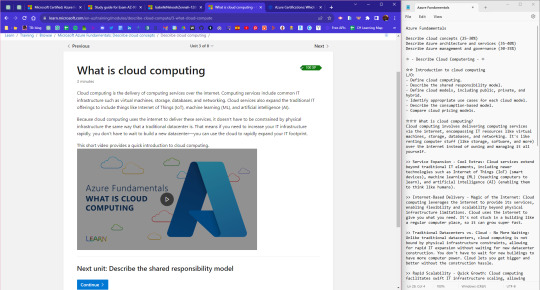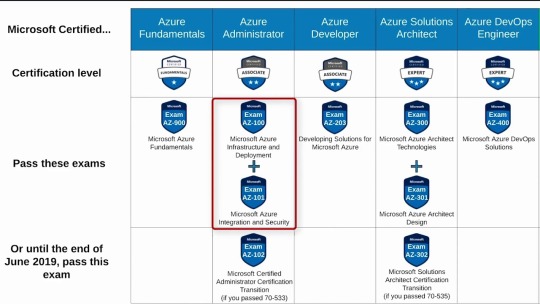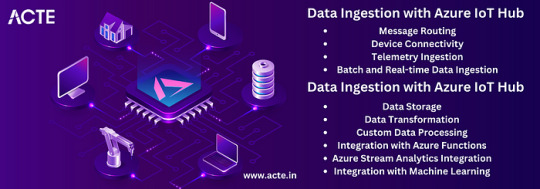#azure cloud microsoft
Explore tagged Tumblr posts
Text
Microsoft Azure Fundamentals

Thursday 17th august 2023
Dad has got me trying to get the Microsoft Azure Fundamentals certification! If you know me, I love my name on certificates so I am trying it out! I haven't been too much into cloud computing so I guess this is a good opportunity to actually learn and see what it's all about.
I know the bare basics that it's storing things not at the company?? Like at work, they store everything in Azure. Again, I may be wrong with the definition - that's why I'm learning!
Learning new things can be fun! ˙˚ʚ(´◡`)ɞ˚˙
#xc: studies#azure studies#codeblr#coding#progblr#programming#studyblr#studying#computer science#microsoft azure#azure certification#tech#cloud computing
31 notes
·
View notes
Text
2 notes
·
View notes
Text

Growth is exciting, but only if your app can handle it! Cloud technology ensures your app scales effortlessly to meet increasing demand. 📈 Get ready for success! 🔗Learn more: https://greyspacecomputing.com/custom-mobile-application-development-services/ 📧 Visit: https://greyspacecomputing.com/portfolio
#GreySpaceComputing#CloudTech#AppScalability#cloudcomputing#cloud#technology#cybersecurity#aws#bigdata#devops#it#datacenter#azure#cloudstorage#linux#programming#software#tech#iot#cloudservices#coding#cloudsecurity#machinelearning#informationtechnology#datascience#business#python#security#microsoft#dataprotection
2 notes
·
View notes
Text
Implementing an effective Security Information and Event Management (SIEM) system is essential for securing your organization's digital infrastructure. Microsoft Sentinel is a cloud-native SIEM solution that provides organizations with sophisticated security analytics and threat intelligence to help them detect, investigate, and respond to threats more efficiently.
#microsoft sentinel#SIEM#security information and event management#cloud#cloud security#azure#azure sentinel#infosectrain#learntorise
2 notes
·
View notes
Text
Google Cloud Professional Cloud Architect Certification. Become a GCP Cloud Architect, Latest GCP Exam and Case Studies.
Google Cloud Platform is one of the fastest-growing cloud service platforms offered today that lets you run your applications and data workflows at a 'Google-sized' scale.
Google Cloud Certified Professional Cloud Architect certification is one of the most highly desired IT certifications out today. It is also one of the most challenging exams offered by any cloud vendor today. Passing this exam will take many hours of study, hands-on experience, and an understanding of a very wide range of GCP topics.
Luckily, we're here to help you out! This course is designed to be your best single resource to prepare for and pass the exam to become a certified Google Cloud Architect.
Why should do a Google Cloud Certification?
Here are few results from Google's 2020 Survey:
89% of Google Cloud certified individuals are more confident about their cloud skills
GCP Cloud Architect was the highest paying certification of 2020 (2) and 2019 (3)
More than 1 in 4 of Google Cloud certified individuals took on more responsibility or leadership roles at work
Why should you aim for Google Cloud - GCP Cloud Architect Certification?
Google Cloud Professional Cloud Architect certification helps you gain an understanding of cloud architecture and Google Cloud Platform.
As a Cloud Architect, you will learn to design, develop, and manage robust, secure, scalable, highly available, and dynamic solutions to drive business objectives.
The Google Cloud Certified - Professional Cloud Architect exam assesses your ability to:
Design and architect a GCP solution architecture
Manage and provision the GCP solution infrastructure
Design for security and compliance
Analyze and optimize technical and business processes
Manage implementations of Google Cloud architecture
Ensure solution and operations reliability
Are you ready to get started on this amazing journey to becoming a Google Cloud Architect?
So let's get started!
Who this course is for:
You want to start your Cloud Journey with Google Cloud Platform
You want to become a Google Cloud Certified Professional Cloud Architect
#googlecloud#aws#cloud#cloudcomputing#azure#google#googlepixel#technology#machinelearning#awscloud#devops#bigdata#python#coding#googlecloudplatform#cybersecurity#gcp#developer#microsoft#linux#datascience#tech#microsoftazure#programming#amazonwebservices#amazon#software#pixel#xl#azurecloud
5 notes
·
View notes
Text
Navigating the Future as Azure Certifications in 2024
In the ever-evolving landscape of cloud technology, Azure certifications continue to be instrumental in shaping the careers of IT professionals and influencing the strategies of organizations worldwide. As we step into 2024, it's essential to explore the current trends, advancements, and the transformative impact that Azure certifications are poised to have in the coming year.
The Continued Relevance of Azure Certifications
Azure certifications are not mere credentials; they are gateways to expertise and recognition in the dynamic world of cloud computing. As businesses increasingly rely on cloud solutions, the demand for skilled Azure professionals continues to grow. In 2024, Azure certifications stand as key assets, ensuring that professionals possess the knowledge and skills needed to navigate the complexities of cloud technology effectively.

Azure Certification Paths in 2024
Azure certifications are structured into comprehensive paths, catering to individuals at various stages of their cloud journey. From foundational certifications for beginners to advanced tracks tailored for specialized roles like Azure Solutions Architect or Azure DevOps Engineer, the certification paths have evolved to align with the diverse needs of IT professionals. The year 2024 sees an increased focus on role-based certifications, allowing individuals to hone specific skills relevant to their job roles.
Key Benefits of Azure Certifications in 2024
Career Advancement:
Azure certifications are a proven catalyst for career growth. In 2024, as businesses seek skilled professionals, holding an Azure certification becomes a valuable asset for those aiming to advance their careers in cloud technology.
Industry Recognition:
Globally recognized, Azure certifications validate one's expertise in Microsoft's cloud services. Employers across industries acknowledge and value these certifications as a mark of proficiency in handling Azure-based solutions.
Continuous Learning Culture:
In 2024, Azure certifications are not just about achieving a one-time qualification; they embody a commitment to continuous learning. Microsoft regularly updates its certification paths to align with emerging technologies, encouraging professionals to stay abreast of the latest industry trends.
Increased Employability:
As the job market becomes more competitive, possessing Azure certifications enhances employability. In 2024, businesses are actively seeking candidates with practical Azure skills, making certification holders highly sought after.
Emerging Trends in Azure Certifications for 2024
Micro-Certifications:
2024 witnesses a rise in micro-certifications, focusing on specific, targeted skills. These bite-sized certifications allow professionals to demonstrate expertise in niche areas, providing a more granular approach to skill validation.
Scenario-Based Assessments:
Azure certification exams in 2024 are increasingly incorporating scenario-based questions. This shift aims to evaluate not just theoretical knowledge but the ability to apply that knowledge in practical, real-world situations.
Integration of AI and ML:
With the growing importance of artificial intelligence (AI) and machine learning (ML), Azure certifications in 2024 are placing a greater emphasis on these technologies. Certification tracks dedicated to AI and ML applications within Azure are gaining prominence.
Focus on Security:
In response to the heightened concern for cybersecurity, Azure certifications in 2024 place a significant focus on security-related tracks. Azure Security Engineer certifications are expected to be in high demand as organizations prioritize securing their cloud environments.
Tips for Success in Azure Certifications 2024
Stay Updated: Given the evolving nature of technology, staying updated with the latest Azure services and features is crucial. Regularly check Microsoft's official documentation and announcements for any updates.
Hands-On Experience: Practical experience is invaluable. Utilize Azure's sandbox environments, participate in real-world projects, and engage with the Azure portal to reinforce your theoretical knowledge.
Leverage Learning Resources: Microsoft provides a wealth of learning resources, including online courses, documentation, and practice exams. Take advantage of these resources to supplement your preparation.
Join the Azure Community: Engage with the Azure community through forums, webinars, and social media. Networking with professionals in the field can provide insights, tips, and support during your certification journey.
Conclusion
As we venture into 2024, Azure certifications stand as pivotal tools for IT professionals aiming to thrive in the dynamic world of cloud technology. Whether you are starting your journey with foundational certifications or advancing your skills with specialized tracks, Azure certifications in 2024 represent more than just qualifications – they symbolize a commitment to excellence, continuous learning, and a future shaped by innovation in the cloud. Embrace the opportunities, stay ahead of the curve, and let Azure certifications be your guide to success in the ever-evolving realm of cloud proficiency.

Frequently Asked Questions (FAQs)
What are the new Azure certifications introduced in 2024?
As of 2024, Microsoft has introduced several new certifications to align with emerging technologies. Notable additions include specialized tracks focusing on AI, ML, and advanced security.
How has the exam format changed for 2024?
The exam format in 2024 has evolved to include more scenario-based questions. This change is aimed at assessing practical application skills in addition to theoretical knowledge.
Are there any prerequisites for Azure certifications in 2024?
Prerequisites vary based on the specific certification. While some foundational certifications may have no prerequisites, advanced certifications often require prior experience or the completion of specific lower-level certifications.
Can I still take exams for older Azure certifications in 2024?
Microsoft often provides a transition period for older certifications, allowing candidates to complete them even as new certifications are introduced. However, it's advisable to check Microsoft's official documentation for specific details.
How frequently are Azure certifications updated?
Azure certifications are regularly updated to stay aligned with the latest technologies and industry trends. Microsoft recommends that candidates stay informed about updates through official communication channels.
4 notes
·
View notes
Text
Why Cloud Strategy Is So Important for Today's Businesses?
Introduction:
In the rapidly evolving landscape of today's digital age, businesses are constantly seeking innovative ways to stay competitive, efficient, and resilient. Among the transformative technologies that have become indispensable is cloud computing. Cloud strategy and design play a pivotal role in harnessing the full potential of cloud services to drive business success. This article explores why crafting a robust cloud strategy and design is crucial for businesses in the contemporary environment.

Agility and Scalability:
Cloud computing offers unparalleled agility and scalability, allowing businesses to adapt quickly to changing market conditions. A well-defined cloud strategy ensures that organizations can scale their resources up or down based on demand, optimizing costs and performance. This flexibility is particularly vital in industries with fluctuating workloads or seasonal demands.
Cost Efficiency:
Cloud services provide a pay-as-you-go model, eliminating the need for substantial upfront investments in physical infrastructure. A carefully crafted cloud strategy allows businesses to optimize their spending by selecting the most cost-effective services and adjusting resources as needed. This cost efficiency is especially beneficial for startups and small to medium-sized enterprises (SMEs) looking to compete with larger counterparts on a more level playing field.
Innovation and Collaboration:
Cloud environments foster innovation by providing easy access to cutting-edge technologies, such as artificial intelligence, machine learning, and big data analytics. Moreover, cloud platforms enable seamless collaboration among teams, allowing employees to work on projects from anywhere in the world. A well-designed cloud strategy supports innovation by leveraging the latest tools and promoting a collaborative work culture.
Security and Compliance:
Security is a top concern for businesses, and cloud providers invest heavily in advanced security measures. However, a comprehensive cloud strategy involves designing a secure architecture, implementing robust access controls, and ensuring compliance with industry regulations. This proactive approach enhances data protection and builds trust with customers and partners.
Business Continuity and Disaster Recovery:
Unforeseen events, such as natural disasters or cyberattacks, can disrupt traditional business operations. Cloud services provide built-in redundancy and disaster recovery options that contribute to a resilient business model. A well-thought-out cloud strategy includes contingency plans, ensuring that critical data and applications can be quickly restored in the event of an outage or data loss.
Global Reach:
Cloud services allow businesses to expand their reach globally without the need for physical infrastructure in every location. This global accessibility enhances the ability to serve customers worldwide, breaking down geographical barriers and opening new market opportunities. An effective cloud strategy considers the geographic distribution of resources to optimize performance and user experience.
Data Analytics and Business Intelligence:
The vast amounts of data generated by modern businesses hold valuable insights that can drive strategic decision-making. Cloud platforms offer powerful tools for data analytics and business intelligence. A well-designed cloud strategy integrates these tools, enabling businesses to derive actionable insights from their data, leading to informed decision-making and improved performance.
Conclusion:
In conclusion, the importance of cloud strategy and design for today's businesses cannot be overstated. From driving innovation and collaboration to ensuring security and compliance, a well-crafted approach to cloud computing is fundamental to achieving business goals in the digital era. As technology continues to advance, businesses that prioritize and invest in a robust cloud strategy will find themselves better positioned to navigate the challenges and capitalize on the opportunities of the ever-evolving business landscape.
4 notes
·
View notes
Text
My Journey with Azure IoT Hub: Connecting and Managing IoT Devices at Scale
The Internet of Things (IoT), which enables seamless connectivity and automation across numerous industries, has completely changed the way we engage with technology. I was curious to learn more about the Internet of Things and its possible uses as an aspiring IoT enthusiast. My experience using Azure IoT Hub, Microsoft’s cloud-based IoT platform, and how it assisted me in connecting and managing IoT devices at scale are both discussed in this blog.
Getting Started with Azure IoT Hub

To embark on my IoT journey, I began by understanding the fundamentals of Azure IoT Hub. Azure IoT Hub is a fully managed service that acts as a central hub for bi-directional communication between IoT devices and the cloud. It provides secure, reliable, and scalable connectivity for IoT solutions. Setting up an Azure IoT Hub was my first step. While the process was relatively straightforward, I encountered a few challenges along the way.
Connecting IoT Devices
Once Azure IoT Hub was set up, I delved into the world of IoT devices. I worked with various types of IoT devices, ranging from simple sensors to complex industrial machines. Connecting these devices to Azure IoT Hub required the implementation of device-specific protocols such as MQTT or HTTP. Additionally, I focused on securing device connections and data transmission by utilizing security features provided by Azure IoT Hub.
Real-world examples of IoT devices connected to Azure IoT Hub are aplenty. For instance, in the healthcare industry, wearable devices can transmit patient vitals to Azure IoT Hub, allowing healthcare providers to monitor and respond to critical situations promptly. In smart homes, IoT devices such as thermostats and security cameras can be connected to Azure IoT Hub, enabling remote control and monitoring capabilities.
Managing IoT Devices at Scale
As my IoT project grew, I encountered the need to scale up the number of connected devices. Azure IoT Hub offered robust device management features that simplified the process of managing a large fleet of devices. I could remotely monitor the health, status, and firmware version of each device, enabling efficient troubleshooting and maintenance. Implementing best practices for device management, such as grouping devices based on location or functionality, enhanced the overall operational efficiency of my IoT solution.
Data Ingestion and Processing
Data collected from IoT devices is a valuable asset that can drive actionable insights and informed decision-making. Azure IoT Hub facilitated the ingestion and routing of data to Azure services for further processing and analysis. I had the opportunity to work with Azure Stream Analytics and Azure Functions, which enabled real-time data processing, transformation, and visualization. Leveraging these services allowed me to unlock the true potential of IoT data and derive meaningful insights.

Security and Compliance
Any IoT solution must prioritize security. Azure IoT Hub provided robust security features that ensured end-to-end protection of IoT deployments. These features included device authentication, message encryption, and integration with Azure Active Directory for access control. Additionally, Azure IoT Hub helped me meet compliance and regulatory requirements by providing built-in support for industry standards such as ISO 27001, HIPAA, and GDPR. Throughout my journey, I learned valuable lessons and implemented best practices for securing IoT solutions.
Scalability and Performance
Scaling an IoT solution to handle thousands or millions of devices is a complex task. Azure IoT Hub offered scalability features that allowed me to effortlessly handle large-scale IoT deployments. With Azure IoT Hub’s device-to-cloud messaging capabilities, I could reliably transmit messages to and from a massive number of devices. Moreover, I gained insights into optimizing IoT solutions for performance by considering factors such as message size, frequency, and device capabilities.
Real-World Use Cases
To understand the versatility of Azure IoT Hub, it is crucial to explore real-world use cases. In the manufacturing industry, Azure IoT Hub can be leveraged to connect and monitor machines on the factory floor, ensuring optimal performance and predictive maintenance. In the agriculture sector, IoT devices connected to Azure IoT Hub can collect data on soil moisture levels, temperature, and humidity, enabling farmers to make data-driven decisions for irrigation and crop management. These use cases highlight the valuable role that Azure IoT Hub plays in various domains and industries.
Future of IoT and Azure IoT Hub
The future of IoT is promising, with emerging trends shaping the landscape. As IoT continues to evolve, Azure IoT Hub will play a crucial role in enabling seamless connectivity, advanced analytics, and artificial intelligence capabilities. Integration with other Azure services and continuous updates from Microsoft ensure that Azure IoT Hub remains at the forefront of IoT innovation. The possibilities for IoT applications are limitless, and Azure IoT Hub will continue to empower developers and organizations to build robust and scalable IoT solutions.
Throughout my journey with Azure IoT Hub, I gained valuable insights and experiences. Azure IoT Hub simplified the process of connecting and managing IoT devices, providing a reliable and scalable platform. The seamless integration with other Azure services allowed me to unlock the full potential of IoT data. Moreover, the security and compliance features provided peace of mind, ensuring that my IoT solution was protected from threats. Overall, Azure IoT Hub has been instrumental in my IoT journey, contributing to enhanced efficiency and productivity.
Recommendations and Tips
For those interested in starting their own IoT journey with Azure IoT Hub, I offer the following recommendations and tips:
Begin with a clear understanding of your IoT use case and requirements.
Familiarize yourself with the documentation and resources provided by Microsoft to gain a solid foundation.
Start small and gradually scale your IoT solution as needed.
Take advantage of the device management and security features offered by Azure IoT Hub.
Leverage other Azure services such as Azure Stream Analytics and Azure Functions to derive meaningful insights from IoT data.
Stay updated on emerging trends and best practices in the IoT space.
To deepen your knowledge of IoT and Azure IoT Hub, I recommend exploring Microsoft’s official documentation, participating in the ACTE Technologies Microsoft Azure training, and attending IoT-focused conferences and events.

Azure IoT Hub has proven to be a powerful and comprehensive platform for connecting and managing IoT devices at scale. Throughout my journey, I witnessed the transformative potential of IoT solutions and the crucial role played by Azure IoT Hub in enabling seamless connectivity, advanced analytics, and robust security. As IoT continues to evolve, Azure IoT Hub will undoubtedly remain at the forefront of IoT innovation, empowering organizations to build scalable and efficient IoT solutions. I encourage readers to embark on their own IoT journeys, leveraging the capabilities of Azure IoT Hub to unlock the full potential of IoT. Join me in embracing the future of IoT and revolutionizing industries through connected devices. Please leave your comments, stories, and inquiries in the space provided below. Let’s continue the conversation and explore the endless possibilities of IoT together.
#microsoft azure#cloud services#information technology#education#tech#technology#iot#innovation#cloud computing
5 notes
·
View notes
Text
But I’m sure they’re being totally responsible with AI.
4 notes
·
View notes
Text
Oooh, more than that, and I want to blab about it!
So in short CrowdStrike, a Cybersecurity company, more or less accidentally cyber attacked Microsoft's Cloud Services via a bugged update. Microsoft uses CrowdStrike's services for their Cloud Services, and missed the bug as well one way or another (in what I hope was an isolated check they did before uploading the updated version to their customers that happened to not have caught the fatal error.)
The update fatally corrupted Microsoft's Cloud System to such a degree that any of their customers using their Cloud Systems in their software were rendered useless.
What the lovely Dean doesn't say here is a lot of these Customers systems are whole POS systems. Aside from diners, every POS systems I've encountered since yesterday has been down and rendered useless: hotels, arcades, some general stores. Mostly it seems like bigger Customers/Companies (bigger companies are using Microsoft's Cloud Services).
Also if anyone is up for PMing me any outages they're experiencing that I don't have listed please lmk! I'm curious and would love to list.
So far I know:
Several Airlines
Several Banks
Several State's 911 lines
Several POS Systems (likely the VM issue)
Several Hospitals
TBC
(research/looking around. I don't have my computer cuz I'm stuck at an airport, but I might go through and see if I can find customer lists and get specific and otherwise update this.)
Here is a link to the Microsoft Cloud/Azure Outage report:
(This is the status history; it is the first ticket 1K80-N_8)
Here is a link to the VM (Virtual Machine) Microsoft Cloud/Azure outage that is currently still active:
(Since it is still active, it is listed on the front page)

rip windows
#CrowdStrike#Cybersecurity#Microsoft Cloud#POS#VM Outage#Azure Outage#ah when I say Microsoft's Cloud System I am referring to Azure tho Azure as I understand has more functionality than basic Cloud#Such as the VM capacity
8K notes
·
View notes
Text
Focus on Your Business: Let Professional IT Services Handle Your Technology Department
For any business to succeed today, its technology infrastructure must be dependable and always operate optimally. Communication, handling data, cybersecurity, and new solutions rely on technology to function in today's world. At the same time, many SMEs find it too costly and demanding to maintain and build an effective IT team within the company. Joining up with expert IT specialists is especially beneficial here, as you are free to focus on essential factors while IT professionals handle everything computer-related. Source URL: https://virtualvivienne.com/focus-on-your-business-let-professional-it-services-handle-your-technology-department/
#managed it services#it services#microsoft 365 consulting#cloud solutions#data backup & ransomware protection#it support#amazon aws consulting#google workspace consulting#it consulting#microsoft azure consulting
0 notes
Text
Quizlet praises me

Saturday 19th August 2023
I'm getting there with my Cloud Computing studies! I am actually remembering things! Okay Loa, don't fall off now!
By the grace of God, I can eventually do some practice exams on this topic of 'Describe cloud computing' o(≧▽≦)o

#xc: studies#codeblr#coding#progblr#programming#studyblr#studying#computer science#microsoft azure#azure certification#tech#cloud computing#azure studies
17 notes
·
View notes
Text
#Cloud Computing#Cloud Servers#Disaster Recovery#Virtual Private Server#Multi-Cloud#AWS#Microsoft Azure#Cloud Security#Hosting Solutions
0 notes
Text
Fix Deployment Fast with a Docker Course in Ahmedabad
Are you tired of hearing or saying, "It works on my machine"? That phrase is an indicator of disruptively broken deployment processes: when code works fine locally but breaks on staging and production.
From the perspective of developers and DevOps teams, it is exasperating, and quite frankly, it drains resources. The solution to this issue is Containerisation. The local Docker Course Ahmedabadpromises you the quickest way to master it.
The Benefits of Docker for Developers
Docker is a solution to the problem of the numerous inconsistent environments; it is not only a trendy term. Docker technology, which utilises Docker containers, is capable of providing a reliable solution to these issues. Docker is the tool of choice for a highly containerised world. It allows you to take your application and every single one of its components and pack it thus in a container that can execute anywhere in the world. Because of this feature, “works on my machine” can be completely disregarded.
Using exercises tailored to the local area, a Docker Course Ahmedabad teaches you how to create docker files, manage your containers, and push your images to Docker Hub. This course gives you the chance to build, deploy, and scale containerised apps.
Combining DevOps with Classroom Training and Classes in Ahmedabad Makes for Seamless Deployment Mastery
Reducing the chances of error in using docker is made much easier using DevOps, the layer that takes it to the next level. Unlike other courses that give a broad overview of containers, DevOps Classes and Training in Ahmedabad dive into automation, the establishment of CI/CD pipelines, monitoring, and with advanced tools such as Kubernetes and Jenkins, orchestration.
Docker skills combined with DevOps practices mean that you’re no longer simply coding but rather deploying with greater speed while reducing errors. Companies, especially those with siloed systems, appreciate this multifaceted skill set.
Real-World Impact: What You’ll Gain
Speed: Thus, up to 80% of deployment time is saved.
Reliability: Thus, your application will remain seamless across dev, test, and production environments.
Confidence: For end-users, the deployment problems have already been resolved well before they have the chance to exist.
Achieving these skills will exponentially propel your career.
Conclusion: Transform Every DevOps Weakness into a Strategic Advantage
Fewer bugs and faster release cadence are a universal team goal. Putting confidence in every deployment is every developer’s dream. A comprehensive Docker Course in Ahmedabador DevOps Classes and Training in Ahmedabadcan help achieve both together. Don’t be limited by impediments. Highsky IT Solutions transforms deployment challenges into success with strategic help through practical training focused on boosting your career with Docker and DevOps.
#linux certification ahmedabad#red hat certification ahmedabad#linux online courses in ahmedabad#data science training ahmedabad#rhce rhcsa training ahmedabad#aws security training ahmedabad#docker training ahmedabad#red hat training ahmedabad#microsoft azure cloud certification#python courses in ahmedabad
0 notes
Text
Microsoft Sentinel is a powerful security platform that helps organizations protect their digital assets from advanced threats and respond to security incidents. With its wide range of use cases and key capabilities, Sentinel enables security teams to detect and investigate potential threats in real time, streamline incident response, and enhance overall security posture.
2 notes
·
View notes
Text
Microsoft Azure Security Engineer Associate Singapore – Master Cloud Security with Xelware
In today’s digital world, cloud platforms like Microsoft Azure are the backbone of modern business infrastructure. As organizations in Singapore continue to shift to the cloud, the need for skilled professionals who can manage and secure cloud environments is growing rapidly. That’s where the Microsoft Azure Security Engineer Associate certification becomes a game-changer.
At Xelware, we offer one of the most comprehensive and hands-on AZ-500: Microsoft Azure Security Technologies training courses in Singapore. Designed for IT professionals, security administrators, and cloud engineers, this course equips you with the skills needed to secure Azure-based digital platforms effectively and confidently.
Why Choose the Azure Security Engineer Associate Certification?
The Microsoft Certified: Azure Security Engineer Associate credential is ideal for professionals responsible for managing cloud security and ensuring secure access, data integrity, and threat protection. With the ever-growing concern around cyber threats and data breaches, certified Azure security engineers are in high demand in Singapore’s tech-driven business environment.
Key benefits of this certification include:
📈 Career Advancement: Enhance your resume and unlock job opportunities in cloud security and infrastructure roles.
🔒 In-Demand Skills: Gain expertise in identity and access management, platform protection, data security, and incident response.
🛠️ Hands-On Learning: Learn how to implement real-world security solutions using Azure tools and best practices.
🧠 Exam Readiness: Be thoroughly prepared to pass the AZ-500 certification exam with confidence.
What You'll Learn at Xelware
Our Azure Security Engineer Associate course in Singapore is structured to cover all critical areas tested in the AZ-500 exam while providing in-depth, practical training that aligns with industry requirements.
Core Modules Include:
Manage Identity and Access
Implement Azure Active Directory (Azure AD) and configure role-based access control (RBAC).
Secure authentication and manage Azure identities and governance.
Implement Platform Protection
Secure virtual networks, configure network security groups, and integrate firewalls and endpoint protection.
Manage Security Operations
Monitor security using Azure Monitor, Microsoft Defender for Cloud, and Azure Sentinel.
Secure Data and Applications
Protect sensitive data through encryption, secure app configurations, and key management.
Each module includes real-world use cases, interactive labs, and best practice scenarios to reinforce your understanding and boost your confidence.
Why Train with Xelware?
Xelware is a trusted name in professional IT training in Singapore. Our courses are delivered by certified Azure experts who bring years of real-world experience into the classroom. Here’s what makes our program stand out:
✅ Expert Trainers: Learn from certified Azure professionals with deep industry knowledge.
✅ Flexible Learning Options: Choose between in-person, virtual, or hybrid classes to suit your schedule.
✅ Real-World Labs: Get hands-on experience with live Azure environments and practice scenarios.
✅ Post-Training Support: We offer exam prep assistance, career guidance, and continued access to learning resources.
✅ High Exam Success Rate: Our proven training methodology has helped hundreds of learners achieve certification success.
Whether you’re upskilling for a promotion, shifting into a new role, or seeking recognition as a cloud security expert, our course is the right step forward.
Who Should Enroll?
This course is perfect for:
IT professionals aiming to specialize in cloud security
Security administrators managing Azure environments
Network and cloud engineers looking to expand their skillset
Anyone preparing for the AZ-500 certification exam
Future-Proof Your Career in Singapore’s Tech Landscape
As Singapore continues to position itself as a smart nation and global tech hub, professionals with expertise in cloud security are more valuable than ever. The Microsoft Azure Security Engineer Associate certification not only validates your skills—it sets you apart in a competitive job market.
0 notes